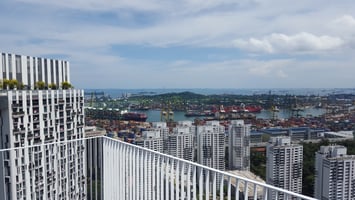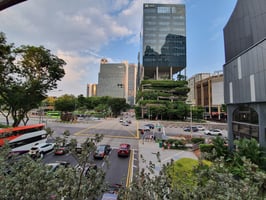Microsoft to shut down LinkedIn website in China as internet censorship increases in the country...
Kusu News 9-Dec-2021
Supply Chains in Southeast Asia Are Less Vulnerable After Delta-Driven Disruptions
Vaccinations have risen and Covid-19 strategies have shifted in some of the region’s major manufacturing countries
6-Dec-2021 WSJ
The Delta-driven wave of infections wreaked havoc on supply-chains when it tore across Southeast Asia this summer, disrupting production of everything from semiconductors to sneakers and raising prices for western consumers.
But countries like Vietnam and Malaysia have learned from that experience and are better prepared for fresh waves of the virus, economists and factory operators say, as the new Omicron variant spreads globally.
Some countries in the region, including Vietnam and Thailand, have shifted away from aggressive Covid-19 containment strategies to boost their economies. That move has been aided by a rapid rise in vaccinations.
Government calculations “have changed to tolerate a much higher level of cases,” said Trinh Nguyen, a senior economist at Natixis.
China Increasingly Obscures True State of Its Economy to Outsiders
New data restrictions have made it harder to get details on what’s happening inside the country
6-Dec-2021 WSJ
China’s Communist Party has long maintained tight control over information, and the effort has intensified under leader Xi Jinping. The country has become increasingly opaque over the past year, even as its presence on the world stage grows.
A new data-security law has made it harder for foreign companies and investors to get information, including about supplies and financial statements. Several providers of ship locations in Chinese waters stopped sharing information outside the country, making it hard to understand port activity there. Chinese authorities have restricted information on coal use, purged documents related to political dissent cases from an official judicial database, and shut down academic exchanges with other countries.
“China has always been a big black box,” said Stephen Nagy, a politics and international studies professor at the International Christian University in Tokyo. The diminishing access to information is making it even harder for foreigners to understand what’s happening in the country, he said, “and that black box becomes even blacker.”
China could win 'trump card' over global economy by taking over Taiwan semiconductor manufacturing
China would gain enormous leverage over U.S. and rest of world amid semiconductor shortage
3 Dec-2021 Fox News
Top experts are sounding the alarm that a Chinese takeover of Taiwan could spell trouble for not only the island's inhabitants but also the global community – including the U.S. – due to Taiwan's dominance in semiconductor manufacturing.
A global shortage in semiconductors came to a head in 2020 during the coronavirus pandemic outbreak and has wreaked havoc on the tech sector and automobile industry since. Semiconductors are small materials, typically made out of silicon, that conduct electricity in products ranging from computers and smartphones to toasters and cars.
Taiwan produces the vast majority of semiconductors globally, supplying 63% of the market’s share compared to the mere 12% the U.S. supplied in 2019. In 2020, China supplied 16% of semiconductors globally.
Concerns have recently mounted over what Chinese control of the semiconductor industry would look like. Experts warn the greater issue is the amount of leverage it would hand the Chinese Communist Party (CCP).
U.S. Invitation to Taiwan for Democracy Summit Tests Ties With China
Biden administration is expanding push to raise Taiwan’s international profile opposed by Beijing
24-Nov-2021 WSJ
The Biden administration invited Taiwan to participate in a meeting of democracies, further bucking Beijing’s long-pressed campaign to isolate the island diplomatically and testing a recent lessening of U.S.-China tensions.
The inaugural Summit for Democracy, a virtual gathering scheduled for Dec. 9 and 10, aims to bring together more than 100 democratic governments and excludes China, Russia and some other countries with authoritarian leaders. By inviting Taiwan, the Biden administration is broadening an effort to include the island in international forums, raising its profile as a bulwark against intimidation by Beijing, which claims Taiwan as its territory.
The stepped-up engagement between the two has triggered consternation in Beijing. While China security specialists said the invitation from Washington isn’t precedent-breaking, it is likely to irk the Chinese leadership.
In a virtual summit meeting earlier this month, President Biden and Chinese leader Xi Jinping discussed differences over Taiwan, but largely decided to look beyond that and other strains from human rights to security to cool down the hostility between the two powers.
New documents back theory that Covid outbreak started in Wuhan lab
20-Nov-2021 The Telegraph
Wuhan scientists were studying viral samples of high-risk bat species living in Laos - the country where the closest relative to Covid-19 has been found, leaked documents show.
In September, researchers discovered a viral strain called Banal-52 in Laos, which shares 96.8 per cent of its genome with Sars-CoV-2 - boosting claims that the pandemic was caused by a natural spillover event, rather than a laboratory leak.
However, it remained unclear how a bat-borne virus from Laos could have ended up sparking an outbreak in Wuhan, more than 1,000 miles away.
Now, leaked emails between EcoHealth Alliance and US government funders show viral samples were being collected from bats in Laos and sent back to the Wuhan Institute of Virology for study.
The emails, uncovered in a Freedom of Information Request by the US-based White Coat Waste Project, suggest that viral DNA from “bats and other high-risk species” were sent to Wuhan between June 2017 to May 2019.
Before Banal-52 was found, the closest relative to Covid-19 was discovered in cave bats in Yunnan, China, where EcoHealth Alliance had also been looking for viruses and sending samples back to the Wuhan Institute of Virology.
-1.jpg?width=146&height=50&name=Kusu%20(1)-1.jpg)



